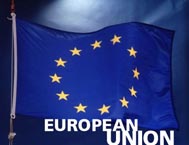Czech Republic takes over EU chair amid crisis
 Prague - The Czech Republic assumed the six-month rotating presidency of the European Union on Thursday, nearly two decades after communism collapsed in the central European country of 10 million.
Prague - The Czech Republic assumed the six-month rotating presidency of the European Union on Thursday, nearly two decades after communism collapsed in the central European country of 10 million.
The second formerly communist nation after Slovenia to hold the presidency took over the EU's helm at a time when the continent faces an economic crisis, Israel is attacking the Gaza Strip and Russia and Ukraine are embroiled in a gas row.
Prague takes over the 27-member bloc from France - an active, strong leader - and will hold the position before handing over to Sweden on July 1.
In an acknowledgment of country's size, Czech leaders said that Prague would seek common ground rather than try to make bold solo steps.
Prime Minister Mirek Topolanek, a close US ally, is to hold the post of the EU's president-in-office until July, while President Vaclav Klaus, an outspoken EU critic and global warming doubter, is to have a limited, ceremonial role.
Klaus, whose provocative statements had stolen the limelight from Topolanek's government in the run-up to the EU presidency, is to address the European Parliament in February and possibly play host during some of the meetings in Prague.
Topolanek's government opted for a humble opening at midnight as no flashy fireworks in the bloc's signature yellow and blue pierced the chilly skies above Prague.
In a rare display, a giant metronome overlooking the city emerged from the darkness, illuminated by the EU's symbol of 12 yellow stars on a blue background.
The clock, which will be lit up for the half year, sits atop a massive concrete pedestal above the Vltava river, which once accommodated a 15.5-metre-tall granite monument of Soviet dictator Joseph Stalin.
Czechs celebrating New Year's arrival in Prague streets seemed to pay little attention to the country's new EU job.
"We do not care. We will judge it after it is over," said 20-year- old law student Dominika Frejtichova.
The presidency is likely to be dominated by the tough task of coordinating the EU's way out of the economic crisis. The Czechs also have ambitious plans to improve the bloc's energy security and draw its eastern neighbours closer to the EU.
In addition, the Czech Republic is the last member state yet to vote on the EU's reform treaty, stalled since Irish voters rejected it in a June referendum.
The parliament has planned to resume debating the pact, designed to streamline bloc's decision-making, in February.
Czech officials, who are to present their plans on January 6, still hope to summon the first top-level EU meeting with Israel in an event that was meant to crown a boost in EU-Israeli relations.
But the ongoing Israeli airstrikes on the Gaza Strip may mar the Czech ambitions to strengthen EU ties with the Jewish state. Czech Foreign Minister Karel Schwarzenberg is likely to lead an EU delegation to the Middle East on Sunday. (dpa)